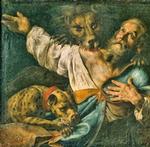citizen kane
By Diogenes ( articles ) | Sep 02, 2008
In discussing the origins of the clergy sex abuse crisis in the United States, OTR has concurred with the judgment that places the chief blame on the bishops and religious superiors. At the same time, we have repeatedly attempted to draw attention to the important (and overlooked) contributory role played by those therapists who frequently and disastrously gave predator priests the green light to return to action.
A recent story concerns the molester Fr. Edward Paquette, whose clerical career saw him molest boys in the Dioceses of Fall River (MA), Fort Wayne-South Bend (IN), and Burlington (VT), before he was finally put on the disabled list in1978. It's clear that each of Paquette's shifts took place because he was known to have preyed on children. And there was always a therapist willing to assure the authorities that Paquette was suitable for a return to ministry.
Between 1974 and 1978 Paquette was an outpatient at the ominously-named House of Affirmation in Whitinsville, Massachusetts, under the care of its founder and director Fr. Thomas Kane. It turns out that Fr. Kane had his own sexual problems with boys, accused by a Massachusetts man of abusing him from 1968 (when he was nine) until 1977, thus overlapping the years he was providing therapy to Paquette. That case against Kane -- now on the lam and believed to be resident in Mexico -- was settled out-of-court in 1995. Others were to follow.
It was Bishop John Marshall of Burlington, Vermont -- Paquette's third diocese -- who sent him to Father Kane and the House of Affirmation in 1974. Their correspondence has recently come to light, and even readers jaded by clerical atrocity stories will gasp at Marshall's willingness to dismiss the concerns of parents, and at Kane's perfidy in minimizing Paquette's risk of reoffending. This from the AP story:
Another exchange of letters between Kane and Marshall in 1978 showed new allegations of sexual misconduct were being directed at Paquette.
Marshall wrote to Kane that he was considering leaving Paquette in his role as parish priest at Christ the King Church in Burlington despite the new allegations.
"Despite the demands of two sets of irate parents that 'something be done about this,' Father Paquette's pastor and I are determined to take the risk of leaving him in his present assignment," Marshall wrote to Kane on April 4, 1978.
"Our thinking is that, knowing the awareness of others concerning his problem, Father Paquette will have reason for 'self control'," the bishop added. "Do you agree with this thinking?"
Kane replied, "I do agree with your thinking. I do not believe it is 'too risky' to leave Father Paquette in his present assignment but, of course, can make no predictions."
"... determined to take the risk." Where would we be without the helping professions? The bishop's condescending and dismissive reference to "irate parents" implies they're over-reacting to Paquette's prior history of child abuse (small wonder Marshall was put in charge of the first visitation of U.S. seminaries in 1985). Kane's pretense of impartial risk assessment is not only cynical but, in the circumstances, malevolent.
His own sexual disturbance apart, did the therapist Kane have clinical reasons to believe Paquette was mendable? Consider this detail from a May 2008 news report:
At one point, [victim attorney Jerome O'Neill had former Burlington Vicar General Wendell Searles] read a letter from an Indiana woman who had written to church officials about Paquette's conduct with her son, a 13-year-old altar boy.
"He told me about three different times he had been asked by Father Paquette to do immoral acts," she said, describing what her son reluctantly told her. "Father kept saying 'Trust in me. God make allowances for this because of medical reasons.'"
Is the "God's medical reasons" dodge the kind of story a 13-year-old, or his mother, is likely to invent out of thin air to frame an innocent priest? You make the call. But the point is that the call you make didn't matter then, and still doesn't matter today, because while the worst of the offenders may have been taken out of action, the therapists who loved them have gone from strength to strength -- except in the cases where, like Kane, they've fallen foul of the law themselves (in 1987, before he was accused of sexual assault, Kane was ousted from the directorship of the House of Affirmation after trustees complained he had diverted agency funds into his own real estate holdings) . Yet being put out of action for criminal wrongdoing is not the same as being put out of action because of negligence, incompetence, or medical malfeasance. Can anyone name a single case where a therapist who abetted a predator's return to ministry has been yanked on the grounds of malpractice? If so, I'd be pleased to learn about it.
Had Kane's sexual recreations and financial chicanery not caught up with him, is there any reason to believe he and his House of Affirmation wouldn't enjoy today the same prestige as the St. Luke Institute? Consider the circumstances: St. Luke's founder died of AIDS, its later directors included some very queer fish, it treated and returned to ministry (among others) the recidivists John Geoghan and Robert Burns, and yet it's still -- in 2008 -- deemed bad taste to point out that its professional staff includes a certified psychodramatist.
Archbishop Wilton Gregory, in 2002, memorably declared, "We have all been enlightened." Skeptical? Just ask Father Kane.
All comments are moderated. To lighten our editing burden, only current donors are allowed to Sound Off. If you are a current donor, log in to see the comment form; otherwise please support our work, and Sound Off!







